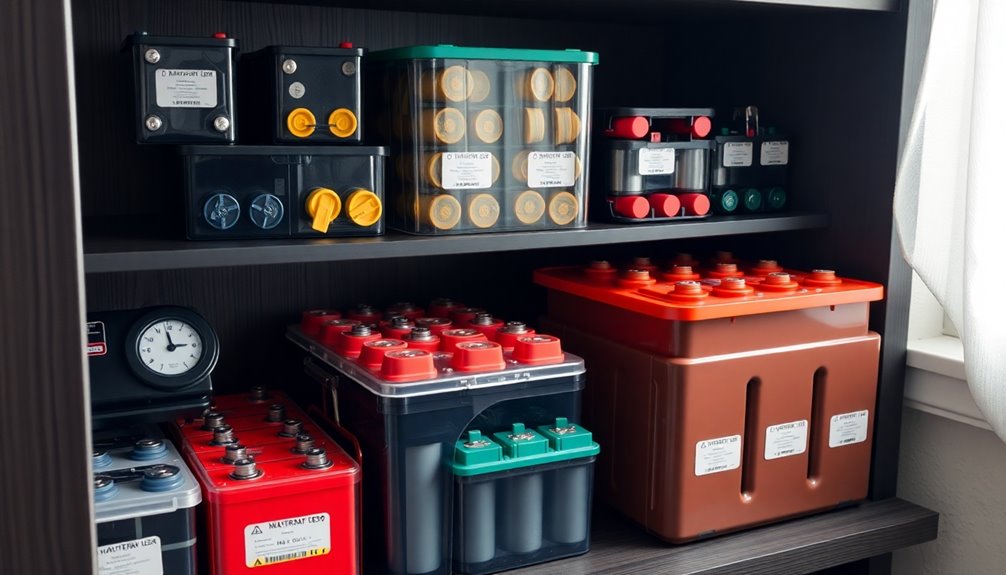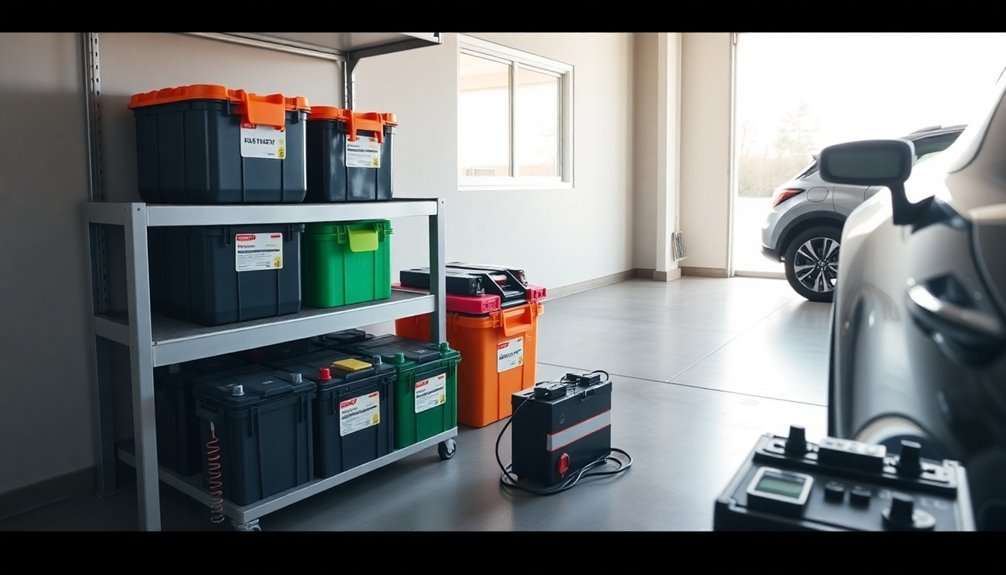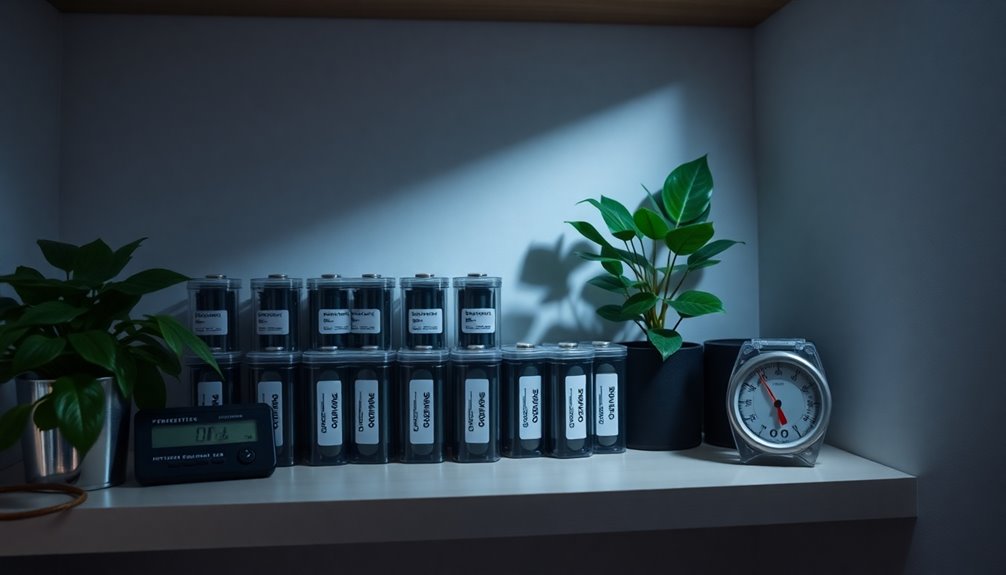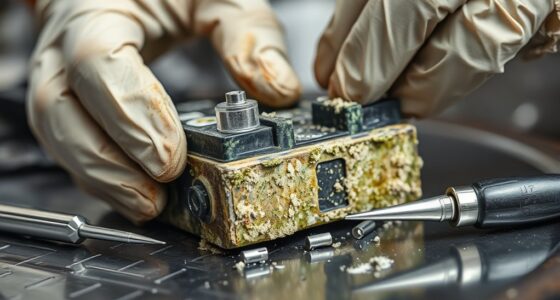To store batteries safely and maximize their longevity, keep them in a cool, dry place, ideally between 68°F and 77°F. Always store batteries in their original packaging or designated containers, with positive ends facing the same way to avoid short-circuiting. Separate batteries to prevent terminal contact and label containers for easy identification. For rechargeable batteries, maintain a charge level of 40%-60% during storage, and monitor temperature and humidity regularly. Clean terminals and be on the lookout for signs of wear. There's plenty more information out there to help you optimize your battery care even further.
Key Takeaways
- Store batteries in a cool, dry place between 68°F and 77°F to enhance their lifespan and prevent damage from extreme temperatures.
- Keep batteries in original packaging or labeled containers, ensuring terminals do not contact each other to avoid short-circuiting.
- Rechargeable batteries should be stored at a 40%-60% charge level and recharged according to recommended schedules for optimal performance.
- Regularly inspect batteries for corrosion, swelling, or leakage, and maintain clean terminals to ensure efficient operation.
- Utilize a battery monitoring system to track charge levels and usage, allowing for timely recharging and inventory management.
Best Practices for Battery Storage

When you store batteries, it's vital to keep them in a controlled environment to guarantee their longevity and safety.
The recommended storage temperature for most batteries is around 68°F to 77°F. Avoid exposing them to extreme heat or cold, as temperatures above 85°F can drastically shorten battery life, while cold conditions may lead to condensation.
Storing batteries properly means keeping them in their original packaging or a designated container, ensuring that the positive ends face the same direction to prevent short-circuiting.
For lithium-ion batteries, aim for a charge level between 40% and 60% to prolong their shelf life.
Regularly check stored batteries for signs of leakage or corrosion, and replace any that show damage to maintain safety.
Household and Rechargeable Battery Care

When it comes to household and rechargeable battery care, proper storage and charging are essential.
Store batteries of the same type and age together to prevent performance issues, and always charge rechargeable batteries to full capacity before use.
Storing Batteries Properly
Storing batteries properly is essential for maximizing their lifespan and ensuring they're ready for use when needed. Here are some key battery care tips:
- Store household batteries in a cool, dry environment at room temperature (around 59 °F/15 °C) to enhance shelf life.
- Keep batteries of the same type and age together; mixing old and new can lead to rapid drainage.
- For rechargeable batteries, maintain a charge level of about 40% before storage to prevent capacity loss.
- Avoid storing batteries with plastic caps removed, especially 9V batteries, to prevent accidental discharge.
- Use designated chargers for specific battery types and promptly remove fully charged rechargeable batteries to avoid overcharging.
Following these tips will greatly improve your batteries' performance and longevity.
Charging Practices Explained
Understanding proper charging practices is vital for both household and rechargeable batteries to guarantee they perform at their best and last longer.
For lithium batteries, store your batteries at about 40% charge capacity; fully charged or depleted batteries can degrade quickly. Always remove a fully charged battery from the charger promptly to prevent overcharging, which can harm battery performance.
It's important to use designated chargers specific to battery manufacturers to avoid hazards and guarantee effective charging. Additionally, avoid mixing batteries of different ages, as this can lead to quicker drainage of newer batteries.
Regularly check the state of charge before storage, since deeply discharging lithium-ion batteries can cause permanent damage. Following these charging practices explained will enhance your battery's lifespan.
Vehicle and Car Battery Maintenance

Maintaining your vehicle's battery is essential for guaranteeing reliable performance, especially if you don't drive regularly. To help you with that, consider these battery storage tips:
- Drive your vehicle every few weeks to keep the car battery charged.
- Disconnect the battery by removing the negative cable first.
- Clean corrosion from battery terminals before storage.
- Use a trickle charger during extended storage to maintain peak charge.
- Always consult your battery manual for specific maintenance tips.
Heat can cause significant damage to car batteries, so store them in a dry location.
By following these steps, you can extend the life of your battery and guarantee reliable performance whenever you need it.
Safe Disposal Practices

When it comes to disposing of batteries, you need to follow your local regulations.
Some areas have specific recycling methods for different types of batteries, so it's crucial to know your options.
Always choose safe disposal practices to protect the environment and your community.
Local Regulations Compliance
Since local regulations for battery disposal can differ greatly, it's crucial to check with your municipality or local sanitation department for specific instructions. Properly disposing of batteries, especially single-use batteries, helps reduce leakage of toxic chemicals that can pose environmental hazards.
Here are some key points to bear in mind:
- Always recycle single-use and larger batteries.
- Look for local recycling options to guarantee safe disposal.
- Check if your area has designated battery drop-off locations.
- Be aware of penalties for improper disposal in your region.
- Use resources like Earth911 and Call2Recycle® for guidance.
Following these local regulations not only promotes safety but also protects the environment from harmful waste.
Make certain you stay informed and compliant!
Recycling Battery Options
Understanding local regulations is just the first step in responsible battery management; knowing your recycling options is equally important. Always check your municipality's rules, as they can vary, especially for single-use batteries.
Use resources like Earth911 and Call2Recycle® to locate nearby facilities for recycling both rechargeable and non-rechargeable batteries, ensuring environmentally safe disposal.
Remember, larger batteries, like car or lithium-ion types, can't go in the trash due to hazardous materials. Improper disposal can lead to toxic leaks, so handle expired or damaged batteries with care, preferably using gloves. Additionally, consider the potential risks associated with investing in precious metals as they can be similar to the environmental impacts of improper battery disposal.
Temperature and Humidity Control

To guarantee your batteries stay in peak condition, it's crucial to control the temperature and humidity in their storage environment. Aim for a cool, dry location with a room temperature between 20°C to 25°C (68°F to 77°F). This helps maintain their performance and extends their life.
Consider the following tips:
- Store batteries away from direct sunlight
- Keep them in a vapor-proof container if humidity is high
- Avoid extreme temperatures above 85°F (29°C)
- Monitor temperature and humidity regularly
- Don't let batteries freeze, as cold can reduce energy output
Key Don'ts for Battery Storage

When it comes to battery storage, there are some key don'ts that everyone should keep in mind.
Avoid storing batteries in plastic sandwich bags; loose batteries can contact each other, leading to short circuits.
Keep your batteries away from metal objects to prevent overheating or fires.
Don't mix old and new batteries in the same container, as this can reduce the life of your batteries and may cause leakage.
Mixing different types of batteries is also a no-go; chemical reactions can happen, resulting in ruptures.
Never intentionally short-circuit a battery, as it can produce intense electrical currents, leading to dangerous situations.
Finally, high humidity can create risks, so store your batteries in a dry environment.
Using Battery Organizers

Storing batteries safely goes beyond just avoiding common pitfalls; it also involves utilizing effective tools like battery organizers.
These organizers not only help you keep your batteries in an organized manner but also enhance the life of a battery when used properly.
Here are some benefits of using battery organizers:
- Labeled compartments for easy identification
- Built-in battery testers for quick charge checks
- Prevents contact between batteries to reduce the risk of short-circuiting
- Encourages responsible recycling of used batteries
- Enhances aesthetic appeal while keeping batteries functional
Monitoring and Maintenance

While you may have your batteries organized, keeping an eye on their condition is essential for guaranteeing they perform at their best. Implementing a battery monitoring system, like Simarine Pico, can help you track energy levels and voltage effectively.
Regular inspections are significant, especially in hot conditions, to catch signs of corrosion or degradation early. For lithium-ion batteries, remember that the self-discharge rate is about 2-3% per month, so check their state of charge regularly to maintain ideal levels.
Following the manufacturer's maintenance guidelines and recharging protocols will extend your batteries' storage life. Finally, keep a log of usage, charge levels, and replacement dates to manage your inventory and guarantee timely recharging or disposal of old alkaline batteries.
Frequently Asked Questions
How Do You Store Batteries for Longer Life?
To store batteries for longer life, you'll want to keep them at room temperature, ideally between 20°C and 25°C.
Use their original packaging or insulated containers to avoid short circuits and environmental damage.
For lithium-ion batteries, charge them between 40% and 60%.
Regularly inspect your batteries for leaks or corrosion, and replace any that show damage.
Finally, guarantee your storage area is dry to help maintain their health over time.
Is It Safe to Store AA Batteries in a Ziploc Bag?
You might think a Ziploc bag is a convenient option for storing AA batteries, but it's not safe. The terminals can accidentally touch metal objects, leading to short-circuiting.
Plus, plastic bags don't protect against moisture, risking battery performance. Instead, store your batteries in their original packaging or a dedicated organizer to keep them separated.
Choose a cool, dry place to maximize their lifespan and guarantee they stay in good condition for when you need them.
How to Store Batteries so They Don't Corrode?
To prevent batteries from corroding, you should store them in a dry, cool place, ideally around 59°F (15°C).
Remove them from devices to avoid leakage. Keep them away from metal objects to prevent short-circuiting, and use original packaging or insulated containers to minimize moisture exposure.
Regularly check for any signs of corrosion or leakage, and dispose of damaged batteries properly to maintain a safe storage area.
Is It Okay to Store Batteries Touching Each Other?
Is it really safe to store batteries touching each other? No, it's not! When batteries come into contact, they can short-circuit, especially if they're of different types or charge levels.
You should keep them in their original packaging or use dividers in a storage container to prevent contact. Also, regularly check for damage or corrosion.
Conclusion
By following these tips for safe battery storage, you'll not only maximize their longevity but also guarantee your home stays safe and organized. Remember, batteries can be more temperamental than a cat during bath time, so keep them in a cool, dry place, and check them regularly. With a little attention and care, you'll power your devices for longer and avoid the hassle of replacements. Stay proactive, and your batteries will thank you!










